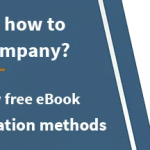Selling a business requires a very carefully thought out process that must be extremely well organized, and as such, this process contains a vital three-phase sequence: the preparation of the company’s documentation, the marketing of the company and ultimately, the negotiation with the buyers.
The process will usually last between 9 and 12 months, although there are frequent examples of when complications are experienced and this timeframe can expand significantly. With this in mind, there have been operations that have lasted several years, however if the process is genuinely respected and well organised, then one can go about ensuring that the timeframe will not go beyond the 9 to 12 length.
1. The Preparation of the Documentation for selling a business
In the process of preparation, there must be the creation of three significant documents:
1. A sales notebook, otherwise considered a memorandum of information, in which it presents the competitive advantages of the company, its capital structure, as well as the relevant financial projections and figures.
2. The company valuation. This document will outline the company’s value drivers, as well as additional elements that will assist negotiations in the final phase of the process.
3. An extended blind teaser of the company is also necessary in order to address and inform potential buyers about the general concepts of the company. This document, as is hinted in the name, ensures the anonymity of the company being sold until the potential buyers sign a confidentiality document called a non-disclosure agreement.
2. The marketing of the company
For this phase of the process, one must first create a mapping document of all possible worldwide buyers. As such, it is very common that the best buyer for your company is not the one that you have in mind. With this in mind, you have to consider that the buyer might not always be located domestically, or be a direct competitor of yours; taking this a step further, the buyer might not even come from the affiliated sector of your company.
For example, we once had a case of a logistics company in the pharmaceutical sector, which we did not sell to a fellow pharmaceutical company. Rather, we sold it to a company that focused on hospitals. We were able to do so because we had analyzed the corporate operations that had recently taken place in the world, and in turn, we found that there had been an instance where a transaction between a hospital and a logistics company for pharmacies had occured. This information gave us a valuable insight into the trends and thought processes that were taking place in other international markets. As a result, as we have suggested is possible, the buyer ended up being a company from a different sector.
Once the best potential buyers are found, it is time to contact the CEOs or top management of the selected company. These companise have been selected largely because they have been perceived to be the best fit for your company, and the ones that will be able to offer the highest price.
This process, which is often conducted by professional advisors, is one that can be considered to be long and laborious. However, in taking this additional time, it can be ensured that the buyer and seller are transparent with each other, share the information necessary, along with their updated perceptions and feelings toward the potential operation.
The negotiation with the buyers
Once you receive your indicative offers, this is when you begin the process of negotiation with respect to what has been offered, and how you wish to potentially adapt them. It is important to not only try find the company’s that is going to pay you the highest price, but also focus on who will be the best managerial fit for your company, as well as who will present the optimal payment method according to your needs.
As such, there are many differing elements that come together during a negotiation. Once there is an agreement with your selected buyer, this is when the official letter of intent is signed. At this point in time, the strength and significance of the negotiations get taken to a new level, as there is now a mindset that an agreement regarding a deal will arrive.
After this letter of intent, there is the necessary process of due diligence; a sometimes tedious but extremely important process that everyone should conduct before buying a company. This process sees the holistic analysis of the target company’s legal, fiscal, labor, legal, environmental and financial situation. As such, a complete analysis of the company is necessary because once acquired, any contingencies that this company may have will become the responsibility and problem of the buyer and therefore, the acquirer should try to prevent or adequately prepare for them as best as possible.
After finalising the due diligence, this leads to another negotiation process. This particular negotiation covers the likes of how to deal with contingencies, ascertaining various guarantees and finally, the revered sale and purchase agreement. However, there one cannot take the sale and purchase agreement for granted. As such, it is a process that can last up to a year and is extremely technical. Therefore, it is essential that you use experienced advisors for this phase, ones that have gone through the process many times and know exactly how to anticipate problems that are likely to arise.
Remember that the buyer will also be accompanied by very experienced advisors. As a result, especially if you are a first time seller, you should not face these experienced advisors and buyers without an experienced team that you can have absolute confidence in. With these trusty advisors on your team, you will be assured that interests will be defended and that you will be guided effectively through the process.
As is detailed, the process of selling a process is a long and extensive one. In trying to complete it alone, you risk becoming lost in the process or simply losing the motivation to get through it all. Unless you truly feel that you know how to maximise the price of your company, it is recommended that you seek out professional advisors with experience in this process. If you feel that you fall into this bracket, do not hesitate to get in touch with our team of trusty advisors.








